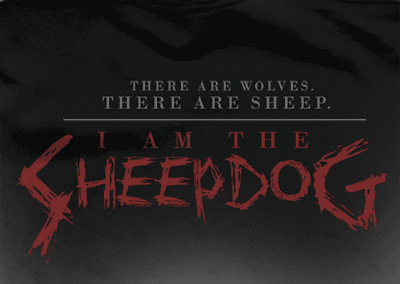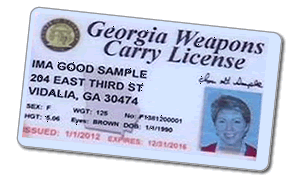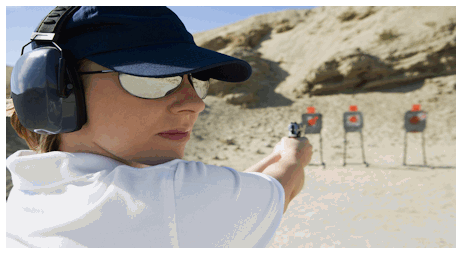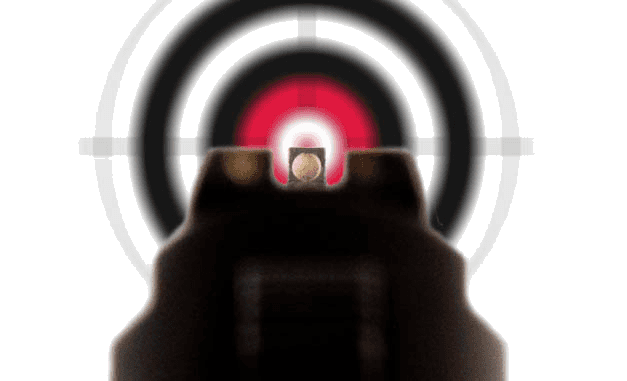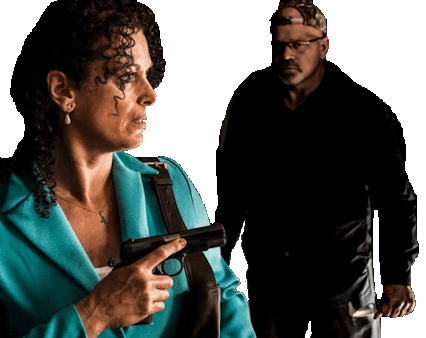Senior Citizens and Handguns
- By proadAccountId-382232
- •
- 10 Oct, 2016
By Bruce N. Eimer, Ph.D.

I was at the range the other day and after shooting a few hundred rounds at the silhouette targets about 40 feet away I noticed that the thumb and wrist of my dominant shooting hand was aching and throbbing. I had noticed slight shooting pains in my thumb earlier in the week when I was using tools and then doing some light curls with the weights in my home gym but didn’t think much about it at the time.
When I got home it was still hurting so I rubbed some Aspercreme on my wrist, the pain subsided and I thought no more about it. But the next day the pain returned and I thought I should probably go see about it. A week later in the doctor’s office I received a stunning diagnosis! I had arthritis! My first thought was that arthritis is an "old" person’s disease and I’m not old. Then another shocker. The doctor asked me how old I was.
In my mind I thought, "Holy crap, I’m 66 years old! Does that qualify me as ‘old’?" Then the doctor confirmed it by saying, "As a senior citizen you have to expect these things. As our body ages lots of changes take place and arthritis is quite common in people of your age." Gee thanks Doc, I didn’t know that. Actually I just didn’t realize, or more likely just didn’t want to admit, that I now fell into the senior citizen demographic. With that realization I went home and applied on-line for Social Security.
"It’s not the age, it’s the mileage," said Indiana Jones. In my case, it’s probably also a lack of maintenance. For my part, I really am happy to have made it this long; it’s the decrepitude, not the age that bothers me. I have finally accepted that I am getting old. I don’t know when it happened but one day I went from the young kid to the man everyone addresses as "sir". There is only a hint of gray around the sides of my head and most everybody thinks I’m about 10 years younger than I am. I took an IQ test online and actually tested at the genius range. Since the test, my wife says I am unbearable to live with now. So my mind is not going but rather I am just having memory problems experienced by most people as they age. It may take me longer to remember something but I eventually remember it. As my doctor explained, forgetting where you parked your car is normal for someone my age. Forgetting you own the car is a serious problem. So enough about me and let’s talk guns. Now that I am a genius I am able to figure out what I have to do to accommodate my advancing years and minor medical issues. I would like to share my thoughts with others who are aging or even those with medical problems which affect their shooting activities.
The most important factor is if you can load/unload and shoot the gun comfortably and safely. Consider the following when in the market for a gun:
- Ease of trigger pull
- Grip strength
- Recoil
- Ease of operation
- Accuracy
1. Ease of Trigger Pull
If you have arthritis, pain, or loss of strength in the hands, racking the slide of a semi-automatic handgun can be difficult, or even impossible. Though semi-automatic handguns, especially those configured like a GLOCK, have the lightest trigger pulls, do not rule out a revolver. Revolvers tend to have harder trigger pulls, but a good gunsmith, or even the gun’s manufacturer can do custom trigger jobs on a revolver to create a lighter trigger pull. An alternative to the revolver, if you want a semi-automatic handgun, is to look at tip-up barrel models, such as the Beretta 86FS Cheetah.
2. Grip Strength
The gun you chose should not put any strain on you when you raise it. Further, shooting the gun must be comfortable. If you buy a gun and find it uncomfortable to shoot, you will be less likely to practice with it, which is necessary for responsible gun ownership. Be mindful of the gun’s overall weight when loaded. Many polymer-framed handguns are lightweight, such as the GLOCK 26 or the S&W M&P. A good choice would be guns with different size backstraps, so you can find one comfortable for you. I would suggest rubber grips over wood grips. Rubber grips provide more comfort and a surer grip when shooting a lot of rounds.
3. Recoil
Smaller, shorter barreled guns have more recoil than guns with a longer barrel. Recoil should be manageable for quick, accurate follow-up shots. 9mm is generally, in my opinion, manageable. A snub-nose .38 is painful. Of course, .22 Long Rifle, .32 ACP, and .25 ACP barely even kick. There are tons of arguments about calibers for self-defense, but Bruce N. Eimer, PH.D in "Arthritis and Choosing a Defensive Handgun" writes about the merits of .380, accurate shot placement is more important than caliber. A center hit with a small caliber is better than a miss with a larger one." So pick what caliber you can shoot repeatedly without causing pain. It is suggested for senior citizens to shoot reduced-recoil loads and chose to shoot the non +P if your gun is +P rated. I have a short-barreled S&W in .38 Special +P-rated, but I shoot normal .38 Special ammunition in it. It still offers the same stopping power.
4. Ease of Operation
As I mentioned above, operating the slide, which loads the first bullet into the chamber and prepares the gun for shooting, may be impossible to operate for some users. A revolver is easy, and pretty fail-safe. Some revolvers that are single-action require you to cock a hammer back for each trigger pull. Other revolvers operate in double-action, which do not require the cocking of a hammer at all. Double-action revolvers are preferable to single-action for a self-defense gun. Some revolvers are hammerless, these types are just point and shoot. Of course, in times of high stress, this might be the best choice. If a semi-automatic handgun is your favored choice, then pick one with simple to use controls. Make sure you can load, unload, change magazines, operate any safeties, and disassemble the gun for cleaning easily. Many modern day polymer-framed pistols have very few controls, and zero complicated safeties.
5. Accuracy
Using iron sights might cause a problem,
if you have degeneration in your eyes, trying to focus on both the front
and rear sight and the distant target will be difficult. Many guns,
both semi-automatic and revolvers offer laser sight models. If you find a
gun you like without a laser, most will accommodate an after-market
laser that is easy to install on your chosen gun. Laser sights line up
with bullet’s trajectory and help you in quick aim and bullet placement.
Some pistols will accommodate a flashlight and a laser, aiding in your
vision further. In addition, there are high-visibility sights you can
add to any gun that utilize tritium that naturally glows in the dark
without needing sunlight to charge.
Some Thoughts for First Time Buyers.

As a senior citizen, when you go to purchase your first defensive handgun for concealed carry, you may find yourself feeling nervous, confused, or "out of your element" at the gun shop. If this is what you experience, join the club! We've all been there and done that! After all, you've experienced a lot of things in your life, but this is a new experience for you. Know that this is where the value of a truly concerned and dedicated professional can shine through. That would be the gun shop sales person from whom you decide to buy your first gun, or second.
His or her role is to explain to you, in terms you can comprehend, with no condescension, the varieties of handguns available, and how they operate. It is important that you resist being seduced into believing that "cute", "sleek", "shiny", or complicated, make for a better defensive weapon. Three key rules of thumb to keep in mind are: (1) Form should follow function. (2) Function follows from a quality firearm chosen wisely by an educated, well-advised consumer. (3) Function follows when you purchase a quality handgun from a knowledgeable and reputable firearms salesperson who cares about your needs, and takes the time to competently explain the gun and how to use it.
When you go to a gun shop or indoor range, do you see other happy senior citizen's hanging around, looking at guns, shooting, and/or conversing about handguns, shooting and self-defense? Are the sales people friendly and helpful? On the other hand, if you go into a gun shop, and you see Bubba and his cousin Jethro, chewing tobacco and snickering at you, get out of there fast!
An ethical gun salesperson or firearms instructor wants to see you on a regular basis and to keep you as a customer or client, as he or she obtains satisfaction from observing you develop your performance skills with your chosen firearm/s. An ethical professional will never push you into buying a particular product. He or she will help you make a truly informed choice, which involves assessing the type of handgun you are most comfortable shooting, carrying and safely storing. He or she stays updated and honest with regard to the quality products on the market.
Try Before You Buy. I suggest that, when shopping for a defensive handgun, you find a range facility that other senior citizens frequent, that will let you rent different handguns, and that offers basic pistol, personal protection, and concealed carry classes taught by qualified, certified instructors. In such a senior citizen-friendly environment, you can best determine which type of handgun will best suit your particular needs, because you can try out different weapons and accessories. It is always best to try before you buy.
The Choice Process. First, educate yourself by gathering information about the different types, makes and models of handguns available. Then, compile a list of your objectives based on your own personal attributes and needs, so that you can make an informed and personally appropriate selection of model and manufacturer. Remember that no one handgun is perfect for everyone, every situation, or for everyone's pocketbook. A handgun can be a great equalizer, but because all handguns were not created equal, you must choose intelligently. If you do so, you will acquire a personal protection tool that you'll be able to enjoy for many years, and then hand down as a family heirloom.
Essential Criteria for a Defensive Carry Gun
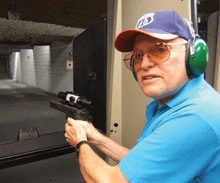
As we age, many of us tend to develop joint problems, arthritis, and hip, back and leg pain. Thus, a concealed carry gun riding on your hip, or in your pocket, that is too big and heavy, may place too much strain on your back, and it may also pull your pants down! Remember, as we age, gravity tends to pull us down enough, such that, sometimes, just carrying ourselves is a chore! So, think light and thin, which equals comfortable to carry concealed. However, also think about how you dress. Will the gun be easy to conceal?
Reliability. While the above criteria are important, we mustn't sacrifice reliability and durability in a carry gun. Remember, if you are going to carry your handgun every day, and practice with it, it must hold up! So, choose a handgun with a reputation for reliability.
Good Fit. Now, in choosing your carry handgun, you must be the judge as to whether the gun you're considering provides a good fit for your hands. Does it point naturally? Is your trigger finger comfortably able to reach the trigger without your having to distort your proper grip?
Unless the gun is a point and shoot gun, are the sights usable? Can you see the front sight clearly with your corrective lenses on? Manageable Recoil. Is the gun comfortable to shoot? Is the recoil manageable? Seriously, if the gun is not comfortable to shoot, you will not shoot it, and then, you will not get your practice time in with the gun. Controllable Trigger. Is the trigger controllable? That means not too heavy of a pull, but not too light either. Bottom line--does it feel right for you? That means, can you operate it without getting finger cramps, and conversely can you feel it when you press it? Can you repeatedly dry fire the gun without making figure eights with the front sight? Are you aware kinesthetically when you've pressed the trigger rearward far enough to cock and fire the weapon? Too light of a trigger spells, ACCIDENTAL DISCHARGE.
Accuracy. In your hands, the gun needs to be reasonably accurate when you shoot it at 10 yards and in. Is the gun forgiving of the arc of movement created by your hand tremor? Are you able to place accurate follow-up shots? Bad guys have a nasty habit of not going down after just one shot. Good second shot recovery is essential. You must be capable of delivering more than one nasty surprise to Mr. Bad Guy!
Simple, Easy, And Safe To Operate. Your defensive handgun should be simple, easy, and safe to operate. If it is an auto-loading pistol, is the slide easy to operate? Do you have the hand strength to be able to pull the slide all the way back to cycle a round into the chamber, or to clear the gun? Can you easily operate the slide stop/release lever to lock the slide back? Can your thumb reach and operate the magazine catch to drop the magazine? If you have a revolver, can your thumb reach and operate the cylinder release latch? Under stress, whatever fine motor skills you do have tends to fly away. So, Simple Is Good (SIG).
Easy To Maintain. Don't choose a gun that's difficult to field strip for routine cleaning and maintenance. The end result will be that you won't maintain it, and it will eventually rot, or it won't work when you need it! As we age, many of us develop arthritis, which makes it difficult to disassemble and reassemble mechanical devices with many, stubborn little parts.
Affordability. The gun should also be affordable to purchase and use. If you're on a fixed income, you don't want to have to sell your firstborn grandchild to afford the gun, or the ammunition for it! If practice ammunition is too expensive, then you may become reluctant to practice. Choose a handgun in a caliber for which there's plenty of cheap, quality, target ammunition, and a good supply of affordable, defensive, jacketed hollow point ammunition.I hope that I have provided some useful info for senior citizens and shooters in general. I am not an expert so nothing I wrote is to be taken as gospel.
Author’s Note: Thanks to our friends at the United States Concealed Carry Association for portions of this article.
Bruce N. Eimer, Ph.D. is a licensed clinical and forensic psychologist, NRA Certified Firearms Instructor, Florida and Utah Concealed Firearms Instructor, and a Professional Writer in Philadelphia, Pennsylvania. Personal Defense Solutions, LLC.
